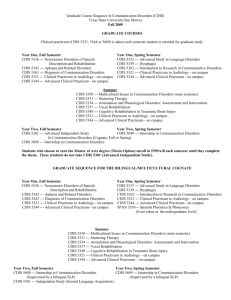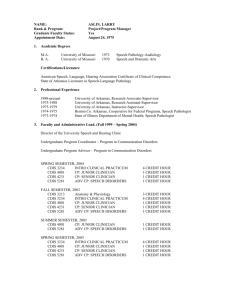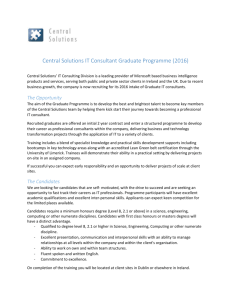Communication Disorders
advertisement
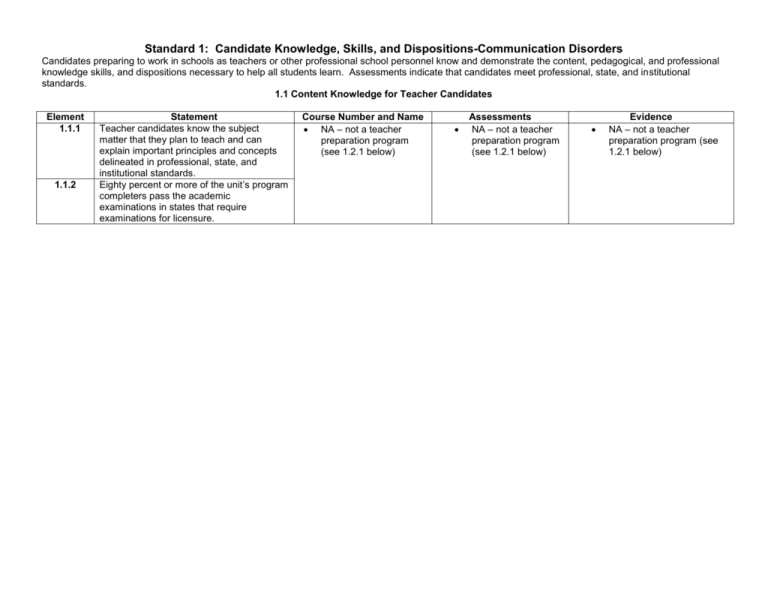
Standard 1: Candidate Knowledge, Skills, and Dispositions-Communication Disorders Candidates preparing to work in schools as teachers or other professional school personnel know and demonstrate the content, pedagogical, and professional knowledge skills, and dispositions necessary to help all students learn. Assessments indicate that candidates meet professional, state, and institutional standards. 1.1 Content Knowledge for Teacher Candidates Element 1.1.1 1.1.2 Statement Teacher candidates know the subject matter that they plan to teach and can explain important principles and concepts delineated in professional, state, and institutional standards. Eighty percent or more of the unit’s program completers pass the academic examinations in states that require examinations for licensure. Course Number and Name NA – not a teacher preparation program (see 1.2.1 below) Assessments NA – not a teacher preparation program (see 1.2.1 below) Evidence NA – not a teacher preparation program (see 1.2.1 below) 1.2 Content Knowledge for Other Professional School Personnel Element 1.2.1 1.2.2 Statement Candidates for other professional school roles know their fields and can explain principles and concepts delineated in professional, state, and institutional standards. Eighty percent or more of the unit’s program completers pass the academic examinations in states that require examinations for licensure. Course Number and Name Sample undergraduate and graduate programs of study are attached Links between courses and knowledge on ASHA KASA* document are provided in a master document, available in materials room Professional Issues Seminars (CDIS 599V, for 4 semesters). Assessments Praxis content scores Comprehensive examination Presentations in CDIS 599V Achievement of documented learning outcomes in all courses, with outcomes linked to ASHA’s KASA* standards for clinical certification Evidence On Praxis Examination in Speech-Language Pathology, only 1 student has failed the exam in 15 years, and that student passed the Praxis at the level set for state licensure for education, then retook and passed the Praxis (98% pass rate) Passing grades on comprehensive exam (only 1 failure in past 15 years, 98%) KASA master Professional Issues topic presentation handouts Presentations at state and national professional conferences Clinical report writing in all semesters of graduate program KASA refers to the Knowledge and Skills Acquisition document now required by the American Speech-Language-Hearing Association to document that entrylevel practitioners have the knowledge and skills necessary for clinical practice. Although the KASA is required for the Certificate of Clinical Competence in Speech-Language Pathology (CCC-SLP), all accredited graduate programs are charged with seeing that students demonstrate satisfactory skills and knowledge prior to graduation. Thus, the accreditation of the graduate program in speech-language pathology is linked to meeting the CCC-SLP standards. Basic KASA forms will be available in the materials room if site visitors are interested in viewing the scope of practice and both knowledge and skills required of graduate students in the M.S. degree program in Communication Disorders. 1.3 Pedagogical Content Knowledge for Teacher Candidates (Initial and Continuing Preparation of Teachers) Element 1.3.1 1.3.2 Statement Teacher candidates have a broad knowledge of instructional strategies that draws upon content and pedagogical knowledge and skills delineated in professional, state, and institutional standards to help all students learn. They facilitate student learning of the subject matter through presentation of the content in clear and meaningful ways and through the integration of technology. Course Number and Name NA—see below 1.5 Assessments NA—see below 1.5 Evidence NA—see below 1.5 1.4 Professional and Pedagogical Knowledge and Skills for Teacher Candidates (Initial and Continuing Preparation of Teachers) Element 1.4.1 1.4.2 Statement Teacher candidates can apply their professional and pedagogical knowledge and skills delineated in professional, state, and institutional standards to facilitate learning. They consider the school, family, and community contexts in which they work and the prior experience of students to develop meaningful learning experiences. Course Number and Name NA—see below 1.5 Assessments NA—see below 1.5 Evidence NA – see below 1.5 1.5 Professional Knowledge and Skills for Other School Personnel Element 1.5.1 1.5.2 Statement Candidates for other professional school roles have an adequate understanding of the professional knowledge expected in their fields and delineated in professional, state, and institutional standards. They know their students, families, and communities; use current research to inform their practices; use technology in their practices; and support student learning through their professional services. Course Number and Name All CDIS graduate courses address professional roles and issues, and instructional strategies (in this case, clinical assessment and treatment) Specific professional knowledge related to practice is provide in four Professional Issues Seminars (CDIS 599V) Practices in specific clinical and educational settings are addressed through on-site and offsite clinical practicum experiences (including CDIS 528V, CDIS 428V, CDIS 5381, CDIS 548V, CDIS 558V, CDIS 568V, CDIS 578V). All CDIS courses consider children with communication disorders within the larger context of family, school, and environment. Graduate courses emphasize coordination of services with preschool or school educational services to facilitate learning (CDIS 5152:CognitiveCommunication Dev. And Disorders, 5112: Early Intervention, 5293, 5163: Seminar in Language Topics Assessments All course assessments, including specific documentation of learning outcomes Comprehensive Exams On-site and off-site clinic evaluations Praxis data Mid-term semester evaluations by faculty Comprehensive exam Praxis exam Specific assessment projects in CDIS 5293, addressing ability to use technology appropriately to facilitate communication Specific projects in CDIS 5213 addressing competence with equipment Grade of B or better in clinical practicum courses (428V) related to hearing Grade of B or better in clinical practicum experiences requiring use of augmentative Evidence Comprehensive Exams (98% pass rate) Praxis exam (98% pass rate) Sample session plans Sample Individualized Treatment Plans Intern evaluations Sample clinical evaluation forms used as formative assessment of student’s skills in assessment and treatment Sample research design papers that demonstrate ability to use electronic resources to find current best practice information Sample projects from relevant courses Sample mid-term evaluation forms 98% pass rate on Praxis 98% pass rate on comps Sample projects from 5293 and 5214 Clinic evaluations and grades CDIS 5293: Augmentative and Alternative Communication directly addresses use of technology to enhance communication development CDIS 5214 Voice Disorders emphasizes technology use for a variety of disorders CDIS 428(1) requires use of extensive audiological equipment communication 1.6 Dispositions for All Candidates Element 1.6.1 1.6.2 Statement Candidates are familiar with the dispositions expected of professionals. Their work with students, families, and communities reflects the dispositions delineated in professional, state, and institutional standards. Course Number and Name Professional Issues Seminars (CDIS 599V, for 4 semesters) Assessments Presentations in Professional Issues coursework Development of questions for community-based practitioners as illustration of perception of issues Evidence Handouts from Professional Issues course Topic lists from Professional Issues courses Successful completion of materials to apply for state and national licensures and certifications 1.7 Student Learning for Teacher Candidates (Initial and Continuing Preparation of Teachers) Element 1.7.1 Statement Teacher candidates focus on student learning as shown in their assessment of student learning, use of assessments in instruction, and development of meaningful learning experiences for students based on their developmental levels and prior experience. Course Number and Name NA (see below) 1.8 Assessments NA (see below) 1.8 Evidence NA (see below) 1.8 1.8 Student Learning for Other Professional School Personnel Element 1.8.1 Statement Candidates for other professional school roles are able to create positive environments for student learning. Course Number and Name All clinical coursework, including CDIS 528V, CDIS 428V, CDIS 5381, CDIS 548V, CDIS 558V, CDIS 568V, CDIS 578V. 1.8.2 They understand and build upon the developmental levels of students with whom they work; the diversity of students, families, and communities; and the policy contexts within which they work. Much developmental information is provided in undergraduate courses (e.g., CDIS 3124: Normal Articulatory-Phonological Development; CDIS 3224: Normal Language Development; CDIS 3213: Anatomy and Physiology: CDIS 4253: Neurological Bases; and CDIS 4273: Communication and Aging. Program adopts a lifespan perspective on development as well as a holistic approach to the needs and environments of persons Diversity (multicultural) content and clinical experiences is addressed through inclusion in all relevant graduate courses, as mandated by ASHA Assessments In each semester, students go through a mid-term assessment process for clinical performance. This process includes a strong formative component of self-analysis. Off-campus supervisors in schools evaluate all aspects of performance in educational setting Comprehensive Exam Praxis Content exam Performance on course level assessments in courses designated in column to left Evidence Sample clinic evaluation forms Sample off-campus evaluation forms High pass rate on comps High pass rate on Praxis Sample discourse analysis projects reflecting adaptation to multicultural differences in language production Sample projects in CDIS 5293 that require students to plan technology assessments that take into consideration pre-school or school level contexts (case assignments) Course Syllabi Sample papers from Research Methods courses or CDIS 4273 emphasizing diversity
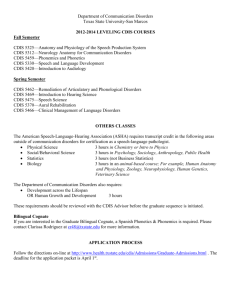
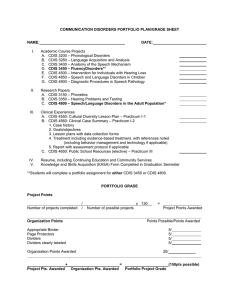
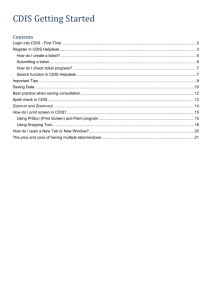
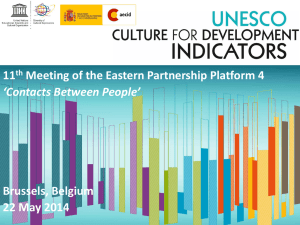
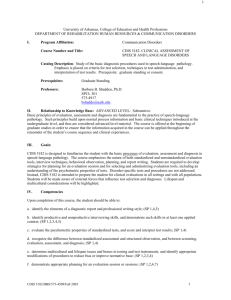
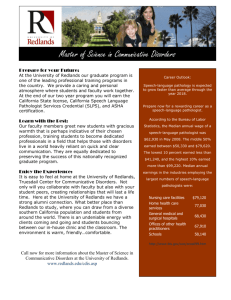
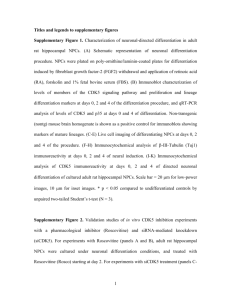
![CDI+Impact+on+RAC[1]](http://s2.studylib.net/store/data/005600152_1-87991b5e70e02cff6dbbfebd48f7ff80-300x300.png)
